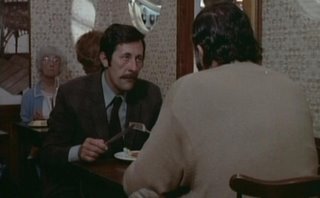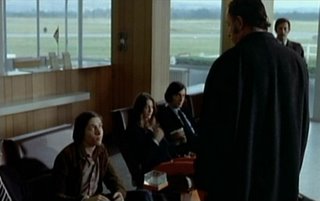
When we first meet Michel Descombes, he's right in his element. He's sharing a meal with a few friends, trading bullshit, and talking about the things friends talk about: Politics, women, television. This scene, as informal and easy is it is, introduces something that will be an undercurrent throughout the movie: The role of socialist politics in French society.
Back at his clock shop the next day, Descombes is interupted by two police officers, who enquire about his missing truck. Descombes says that he assumes his son Bernard has it. He goes with the two cops and passes the truck abandoned on the road, and this leads to the revelation that his son has killed a man named Rozon, and has gone on the run, along with his girlfriend.
The cop investigating the case is Inspector Guilboud (Jean Rochfort), and a curious relationship develops between he and Descombes. Descombes' initial fear is that the police will shoot Bernard when they see him, but Gilboud re-assures him that that "only happens in the movies". The film provides multiple encounters between the two men, and it's curious that none of them are in "police" situations. Guilboud runs into Descombe while grocery shopping, or walking his dog, and the two men talk. These encounters are what start to point up to Descombes how little he really knows his son. Time and time again, his response to one of Guilboud's questions is "I don't know....He didn't talk to me".
 One of these interviews reveals a woman named Madelaine, who looked after Bernard when he was young, and Descombes hunts her down to see if she has had any contact. She has, indeed, and amazingly seems to know far more about Bernard than his father. Unbeknownst to his father, Bernard had visited her several times, and from hearing her talk, it's plain that Bernard views her as a mother figure.
One of these interviews reveals a woman named Madelaine, who looked after Bernard when he was young, and Descombes hunts her down to see if she has had any contact. She has, indeed, and amazingly seems to know far more about Bernard than his father. Unbeknownst to his father, Bernard had visited her several times, and from hearing her talk, it's plain that Bernard views her as a mother figure.
It's also fair to mention the way French politics creep into the story. The murdered man is a former soldier, who had served in Indochina and Algeria, and was also the owner of the factory where the girlfriend worked, and the film shows both halves of the political spectrum having their way with the facts of the case. The right sees the chance to associate the murder of a "war hero" with the subversive left, while the left paints Rozon as a lecherous capitalist monster.
For a film that revolves around a murder, it's surprising how little time it spends on the nuts and bolts of the investigation. Bernard doesn't even appear onscreen until the film is over an hour gone. No, The Clockmaker is really about Michel Descombes, and his realization that he may lose his son without really knowing him. After Bernard's arrest, Descombes becomes obssessed with supporting his son, probably to Bernard's detriment. Guilboud puts forth a theory for why the murder occurred - Rozon may have raped the girlfriend, and she told Bernard about it. If this was the case and it was a "Crime of Passion", then years could be trimmed off his sentence. Bernard denies this theory, and Descombes stands by his son's story. The boy gets twenty years.
The Clockmaker was the first feature turned out by Bertrand Tavernier, who had originally been a law student and a critic for Cahiers Du Cinema. His films are universally of high quality , and they cut across lines of genre and style. The actor Philippe Noiret was with him in the beginning as Michel Descombes, and has been there many times since, in films like The Judge and the Assassin and the great noir Coup De Torchon. Noiret is the anti-leading man. Big, silent and perpetually rumpled, he looks more like the guy who'd come to fix your furnace than a movie star, but his everyman quality has been vital to the feel of Tavernier's films.

Watch Noiret as he sees his son behind bars at the film's close. The tension between the two is gone now, and Descombes talks about the girlfriends' baby on the way, and recounts a story about his days in WW2. After he finishes, he smiles and muses, "I don't know why I told you that". Maybe he doesn't , but he should - It's the kind of thing that he didn't do for all those years. As he walks away from the prison, he absent-mindedly touches the walls of the prison and a small smile comes over his face, as he savours this intimate little moment with his son. Better late than never.
No comments:
Post a Comment